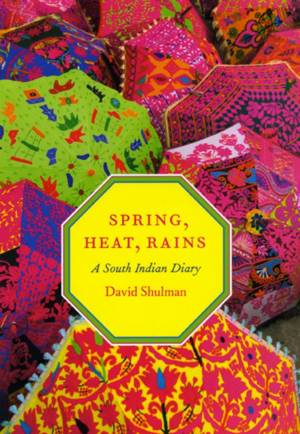
- Retrait gratuit dans votre magasin Club
- 7.000.000 titres dans notre catalogue
- Payer en toute sécurité
- Toujours un magasin près de chez vous
- Retrait gratuit dans votre magasin Club
- 7.000.0000 titres dans notre catalogue
- Payer en toute sécurité
- Toujours un magasin près de chez vous
Description
"Rocks. Goats. Dry shrubs. Buffaloes. Thorns. A fallen tamarind tree." Such were the sights that greeted David Shulman on his arrival in the South Indian state of Andhra Pradesh in the spring of 2006. An expert on South Indian languages and cultures, Shulman knew the region well, but from the moment he arrived for this seven-month sojourn he actively soaked up such simple aspects of his surroundings, determined to attend to the rich texture of daily life--choosing to be at the same time scholar and tourist, wanderer and wonderer. Lyrical, sensual, and introspective, Spring, Heat, Rains is Shulman's diary of that experience. Evocative reflections on daily events--from explorations of crumbling temples to battles with ineradicable bugs to joyous dinners with friends--are organically interwoven with considerations of the ancient poetry and myths that remain such an inextricable part of life in contemporary India. With Shulman as our guide, we meet singers and poets, washermen and betel-nut vendors, modern literati and ancient gods and goddesses. We marvel at the "golden electrocution" that is the taste of a mango fresh from the tree. And we plunge into the searing heat of an Indian summer, so oppressive and inescapable that when the monsoon arrives to banish the heat with sheets of rain, we understand why, year after year, it is celebrated as a miracle. An unabashedly personal account from a scholar whose deep knowledge has never obscured his joy in discovery, Spring, Heat, Rains is a passionate act of sharing, an unforgettable gift for anyone who has ever dreamed of India.
Spécifications
Parties prenantes
- Auteur(s) :
- Editeur:
Contenu
- Nombre de pages :
- 254
- Langue:
- Anglais
Caractéristiques
- EAN:
- 9780226755762
- Date de parution :
- 01-11-08
- Format:
- Livre relié
- Format numérique:
- Ongenaaid / garenloos gebonden
- Dimensions :
- 161 mm x 235 mm
- Poids :
- 494 g

Les avis
Nous publions uniquement les avis qui respectent les conditions requises. Consultez nos conditions pour les avis.






